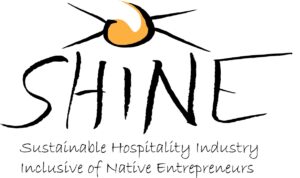- HOME
- PROJECTS
- Featured in Home
- EU SWITCH-Asia "SHINE" Project - Sustainable Hospitality Industry Inclusive of Native Entrepreneurs in Bhutan
SHINE – Sustainable Hospitality Industry Inclusive of Native Entrepreneurs

SHINE Logo
Two reciprocal strategies were adopted as specific objectives:
- To promote the worthy tourism destinations and resources in rural Bhutan towards tourists and achieve a fair distribution of sustainable tourism value (“Bring tourists to where the products are made”)
- To enable indigenous entrepreneurs of agro- and handicraft-products to generate sustainable income by participating in the tourism supply chain (“Bring the products to where tourists are”)
Target groups/Beneficiaries
Tourism MSMEs (hotels, resorts, home/farm-stays enterprises and restaurants), rural producers/cooperatives/groups (farmers, agri-food processing industries, handicraft industries), national/provincial public authorities, vocational training institutes for hospitality/agri-food processing and product design, inter/national tourists, and tour operators and guides were target groups and/or final beneficiaries of the SHINE project. Cooperation between stakeholders along the tourism value chain was encouraged and strengthened.
Introduce local products to the tourism The Regional Food Programme was established to promote indigenous cuisine and to demonstrate the availability of domestic resources. The SHINE e-commerce website and a mobile connects producers and buyers. A training course was also offered.
Improve production of agro products and handicrafts Based on the observations and interactions with the final beneficiaries, specific technical needs were identified. A few Appropriate Technology solutions were developed, tested and implemented: a food dehydrator and a potter’s kiln were built; improved production methods for wood surface treatment, alcohol beverage distillation were studied; and better food packaging and labelling were proposed.
New products and services Training programmes were organized to educate selected producers, including the design thinking & skill training for craftspeople, the food processing and preservation training, and the cooking training for hospitality service providers. The capacity building programme resulted in a number of new handicraft products, increased income, improved quality, diversified product types, and more employment. New agricultural products, such as fermented chilli paste, flavoured whey drink and rice ara, were introduced. Throughout the project, cooperations and interlinkages were made with multiple associations and governmental bodies, as well as between producer groups.
The action helped producer groups and final beneficiaries prepare for more tourists with better products and services. On the consumption side of the value chain, the action shed light on both the material and immaterial tourism assets in the eastern and southern regions.
Highlighting of seven eastern and southern districts as potential tourist destinations
Download Tourism Attraction Books (TAB) Series in the following links:
Establishment of an e-commerce platform & Raising awareness of indigenous recources, knowlage and skills
You can see diverse agricultural proudcts, handicraft products, accommodations, and tour packages available in the eastern Bhutan in the following link:
Development of various appropriate technology solutions to increase volume and quallity of products
The SHINE project developed:
- Development of new handicrafts and agricultural products;
- Capacitating rural producer groups and diversifying their skill applications; and
- Publishing success stories for replication.